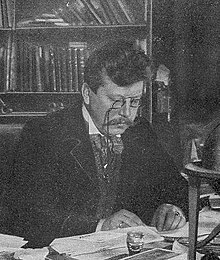Albrecht Dieterich
Albrecht Dieterich | |
|---|---|
| Spouse | Maria Usener |
| Children | Hermann Sr., Hermann Jr. |
| Parent | Albrecht Sr & Henriette Münscher D. |
| Academic background | |
Richard Reitzenstein | |

Albrecht Dieterich (2 May 1866 – 6 May 1908) was a German
classical philologist and scholar of religion born in Hersfeld
.
Academic background
He studied at the Universities of
Leipzig and Bonn. At Leipzig he studied with professors Georg Curtius, Otto Crusius and Otto Ribbeck. At Bonn he studied with Franz Bücheler, Reinhard Kekulé von Stradonitz and Hermann Usener (1834–1905).[1] Usener in 1899 became Dieterich's father-in-law. In 1888 he earned his doctorate, and three years later received his habilitation in Marburg with a dissertation on Orphism. He had come to Marburg on the insistence of Georg Wissowa and even contributed the entry on Aeschylus in the Pauly-Wissowa Realencyclopädie der classischen Altertumswissenschaft.[2] For his Staatsexamen, he chose the theme 'What do we know about Plato
's theism or pantheism?'. Afterwards he traveled to Italy and Greece for research purposes during the years 1892-1895.

In 1895 he returned to
University of Heidelberg
. He was working on his magnum opis, the Geschichte des Untergangs der antiken Religion, a detailed critical study of classical religion, but was unable to complete it.
In 1903, he co-founded the study group Eranos with a fellow Marburg student, Gustav Adolf Deissmann. The two, along with Wissowa and Wilhelm Schulze, were part of a daily Tischrunde 'von glücklischter Zusammensetzung', an informal learned society of Classics scholars.[3]
He died at Heidelberg from
cerebral apoplexy
.
Ideas
Dieterich was notable for identifying the origin & use of manuum vellatio. He notes that the ritual was originally
Constantine VII Porphyrogenitus, which noted the ritual being used from Diocletian's time till the Byzantine period.[4]
Dieterich also noted parallels between the myths of the Pythian Dragon, the birth of Apollo to Leto and the Woman of the Apocalypse.[5]
Works
Much of Dieterich's work involved research of traditional beliefs,
Mithraic origin of the liturgy.[7] He participated in a long standing debate with Franz Cumont over his Mithraic interpretation of the papyrus.[8]
Other significant works by Dieterich include:
- De hymnis Orphicis capitula quinque (Marburg, 1891).
- Nekyia: Beiträge zur Erklärung der neuentdeckten Petrusapokalypse, (1893) – Nekyia; contributions to the explanation of the newly revealed Apocalypse of Peter.
- Die Grabschrift des Aberkios, (1896) – The grave inscriptions of Aberkios.
- Mutter Erde, (1905) – Mother Earth.
- Kleine Schriften, (1911). Richard Wünsch (ed). – Smaller works.
- Pulcinella: pompejanische Wandbilder und römische Satyrspiele (Leipzig, 1897). Comic characters from classical antiquity to contemporary times.
- de:Archiv fur Religionwissenschaft (edited 1904 with Thomas Achelis, 1905-1908 sole editor)
- de:Religionsgeschichtliche Versuche und Vorarbeiten (1902-1908)
- Papyri Graecea Magicae: Compiled papyri which were published posthumously in two editions.
Notes
- ^ "DIETERICH, Albrecht". dbcs.rutgers.edu. Database of Classical Scholars, Rutgers University. Retrieved 2023-12-16.
- JSTOR 43768160.
- ISBN 978-3-11-022432-0.
- ISBN 978-3-16-149411-6.
- ISBN 978-90-04-13639-7.
- ^ Richard Turcan (1987). "Dieterich, Albrecht | Encyclopedia.com". www.encyclopedia.com. Retrieved 2023-12-16.
- ISBN 0891301135.
- ISBN 978-0-19-028319-3.
References
- ISBN 978-0-8356-0568-7
- "This article incorporates text from an equivalent article at the ISBN 3-428-00184-2, S. 669 f.
